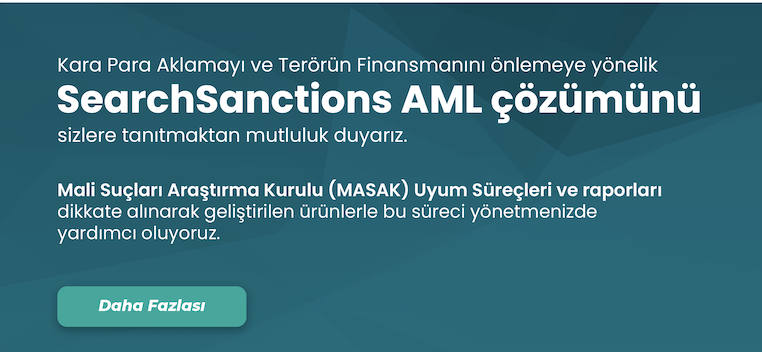Sanction Lists in Money Laundering
FATF recommends that risky customer transactions and services should be monitored and controlled, and in suspicious cases, necessary notifications should be made after the transactions are reviewed by the compliance officer.
In this context, the duty of obliged parties is to recognise and monitor our customers in establishing business relationships.
As stated by the FATF, "It will be a natural and inevitable part of this system to compare the persons and entities with which business relations will be established with the lists of internationally objectionable persons/organisations and to follow up such lists with a risk-based approach.
In this context, it is recommended that you question your customers from the national and international banned and sanction lists recommended to be followed during the business relationship and check whether all your customers are included in these lists in routine periods that you will determine during the business relationship.
Money laundering is a method used to give the proceeds of crime a legal appearance. This is an international problem and the governments of many countries take various measures to combat financial misconduct. Sanctions lists are one of the effective tools to prevent money laundering and terrorist financing. In this blog post, we will emphasise the importance of sanctions lists in money laundering and explain how they work.

Definition of Sanctions Lists: Sanctions lists are official lists used to combat money laundering, terrorist financing and other financial misconduct. These lists are created by governments or regulatory agencies at the international or national level. The lists include individuals, institutions or countries involved in criminal activities. These individuals or institutions may face restrictions on financial transactions, asset freezes or other sanctions.
Impact of Money Laundering on Financial Systems: Money laundering poses a serious threat to financial systems. The proceeds of crime are laundered through financial systems by appearing to be a legitimate source. This situation damages the integrity and reliability of the financial system. Money laundering jeopardises economic stability, hinders investment, leads to tax losses and supports the activities of organised crime syndicates. Sanctions lists are an effective tool to combat such abuses.
How Sanctions Lists Work: Sanctions lists contain the names of individuals or organisations found to be involved in criminal activities. Lists are created through international co-operation and information sharing. Banks, financial institutions and other relevant parties try to identify potential risks by comparing the names of their customers with the sanctions lists and take appropriate measures. Financial institutions tighten customer identification and follow-up processes to avoid doing business with persons or entities associated with sanctions lists. This is an important step to protect the reliability and integrity of the financial system.
Effects of Sanctions Lists: Persons or entities on sanctions lists are generally subject to restrictions on financial transactions. These restrictions may take different forms, such as asset freezes, travel restrictions, and bans on arms trade. In addition, persons or entities that assist or do business with persons or entities on sanctions lists may also face sanctions. Sanctions help to financially disrupt criminal activity and narrow the scope of action for criminals.
International co-operation: Sanctions lists are a product of international co-operation and co-ordination. Combating money laundering requires international co-operation and information sharing. Countries cooperate to follow sanctions lists, exchange information and track the movements of criminals. This co-operation makes it more difficult for criminals to move across borders and ensures effectiveness in combating financial misconduct.
Money laundering and financial abuses are a global problem and cause serious damage to financial systems. Sanctions lists have emerged as an effective tool in combating these abuses. Sanctions lists identify individuals or institutions found to be involved in criminal activities and impose restrictions on financial transactions. This is intended to protect the reliability and integrity of the financial system. International co-operation and information sharing enhance the effectiveness of sanctions lists and play an important role in tracking the movements of criminals. Sanctions lists in money laundering will remain an important tool in the fight against financial misconduct and continued co-operation and co-ordination at the international level will be necessary.
Request Demo
You can contact us as to our services, integration processes, request demo or customized solutions.

